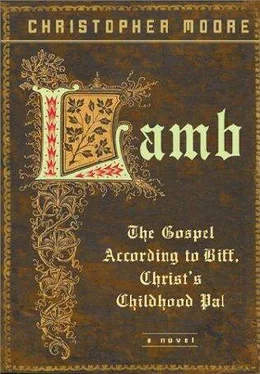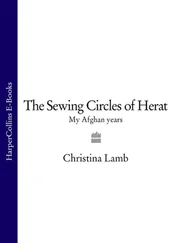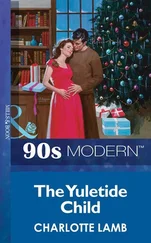“I’ll get you a map.”
And he did. Unfortunately the concierge was only able to find a map of the world provided by an airline that partners with the hotel. So who knows how accurate it is. On this map the next leg of our journey is six inches long and would cost thirty thousand Friendly Flyer Miles. I hope that clears things up.
The trader’s name was Ahmad Mahadd Ubaidullaganji, but he said we could call him Master. We called him Ahmad. He led us through the city to a hillside where his caravan was camped. He owned a hundred camels which he drove along the Silk Road, along with a dozen men, two goats, three horses, and an astonishingly homely woman named Kanuni. He took us to his tent, which was larger than both the houses Joshua and I had grown up in. We sat on rich carpets and Kanuni served us stuffed dates and wine from a pitcher shaped like a dragon.
“So, what does the Son of God want with my friend Balthasar?” Ahmad asked. Before we could answer he snorted and laughed until his shoulders shook and he almost spilled his wine. He had a round face with high cheekbones and narrow black eyes that crinkled at the corners from too much laughter and desert wind. “I’m sorry, my friends, but I’ve never been in the presence of the son of a god before. Which god is your father, by the way?”
“Well, the God,” I said.
“Yep,” said Joshua. “That’s the one.”
“And what is your God’s name?”
“Dad,” said Josh.
“We’re not supposed to say his name.”
“Dad!” said Ahmad. “I love it.” He started giggling again. “I knew you were Hebrews and weren’t allowed to say your God’s name, I just wanted to see if you would. Dad. That’s rich.”
“I don’t mean to be rude,” I said, “and we are certainly enjoying the refreshments, but it’s getting late and you said you would take us to see Balthasar.”
“And indeed I will. We leave in the morning.”
“Leave for where?” Josh asked.
“Kabul, the city where Balthasar lives now.”
I had never heard of Kabul, and I sensed that was not a good thing. “And how far is Kabul?”
“We should be there in less than two months by camel,” Ahmad said.
If I knew then what I know now, I might have stood and exclaimed, “Tarnation, man, that’s over six inches and thirty thousand Friendly Flyer Miles!” But since I didn’t know that then, what I said was “Shit.”
“I will take you to Kabul,” said Ahmad, “but what can you do to help pay your way?”
“I know carpentry,” Joshua said. “My stepfather taught me how to fix a camel saddle.”
“And you?” He looked at me. “What can you do?”
I thought about my experience as a stonecutter, and immediately rejected it. And my training as a village idiot, which I thought I could always fall back on, wasn’t going to help either. I did have my newfound skill as a sex educator, but somehow I didn’t think there’d be call for that on a two-month trip with fourteen men and one homely woman. So what could I do, what skill had I to gentle the road to Kabul?
“If someone in the caravan croaks I’m a great mourner,” I said. “Want to hear a dirge?”
Ahmad laughed until he shook, then called for Kanuni to bring him his satchel. Once he had it in hand, he dug inside and pulled out the dried newts he’d bought from the old hag. “Here, you’ll be needing these,” he said.
Camels bite. A camel will, for no reason, spit on you, stomp you, kick you, bellow, burp, and fart at you. They are stubborn at their best, and cranky beyond all belief at their worst. If you provoke them, they will bite. If you insert a dehydrated amphibian elbow-deep in a camel’s bum, he considers himself provoked, doubly so if the procedure was performed while he was sleeping. Camels are wise to stealth. They bite.
“I can heal that,” Joshua said, looking at the huge tooth marks on my forehead. We were following Ahmad’s caravan along the Silk Road, which was neither a road nor made of silk. It was, in fact, a narrow path through the rocky inhospitable highland desert of what is now Syria into the low, inhospitable desert of what is now Iraq.
“He said sixty days by camel. Doesn’t that mean that we should be riding, not walking?”
“You’re missing your camel pals, aren’t you?” Josh grinned, that snotty, Son-o’-God grin of his. Maybe it was just a regular grin.
“I’m just tired. I was up half the night sneaking up on these guys.”
“I know,” said Joshua. “I had to get up at dawn to fix one of the saddles before we left. Ahmad’s tools leave something to be desired.”
“You go ahead and be the martyr, Josh, just forget about what I was doing all night. I’m just saying that we should get to ride instead of walking.”
“We will,” Josh said. “Just not now.”
The men in the caravan were all riding, although several of them, as well as Kanuni, were on horses. The camels were loaded down with great packs of iron tools, powdered dyes, and sandalwood bound for the Orient. At the first highland oasis we crossed, Ahmad traded the horses for four more camels, and Joshua and I were allowed to ride. At night we ate with the rest of the men, sharing boiled grain or bread with sesame paste, the odd bit of cheese, mashed chickpeas and garlic, occasionally goat meat, and sometimes the dark hot drink we had discovered in Antioch (mixed with date sugar and topped with foaming goat’s milk and cinnamon at my suggestion). Ahmad dined alone in his tent, while the rest of us would dine under the open awning that we constructed to shelter us from the hottest part of the day. In the desert, the day gets warmer as it gets later, so the hottest part of the day will be in the late afternoon, just before sundown brings the hot winds to leach the last moisture from your skin.
None of Ahmad’s men spoke Aramaic or Hebrew, but they had enough functional Latin and Greek to tease Joshua and me about any number of subjects, their favorite, of course, being my job as chief camel deconstipator. The men hailed from a half-dozen different lands, many we had never heard of. Some were as black as Ethiopians, with high foreheads and long, graceful limbs, while others were squat and bowlegged, with powerful shoulders, high cheekbones, and long wispy mustaches like Ahmad’s. Not one of them was fat or weak or slow. Before we were a week out of Antioch we figured out that it only took a couple of men to care for and guide a caravan of camels, so we were perplexed at why someone as shrewd as Ahmad would bring along so many superfluous employees.
“Bandits,” Ahmad said, adjusting his bulk to find a more comfortable position atop his camel. “I’d need no more than a couple of dolts like you two if it was just the animals that needed tending. They’re guards. Why did you think they were all carrying bows and lances?”
“Yeah,” I said, giving Joshua a dirty look, “didn’t you see the lances? They’re guards. Uh, Ahmad, shouldn’t Josh and I have lances—I mean, when we get to the bandit area?”
“We’ve been followed by bandits for five days now,” Ahmad said.
“We don’t need lances,” Joshua said. “I will not make a man sin by committing an act of thievery. If a man would have something of mine, he need only ask and I will give it to him.”
“Give me the rest of your money,” I said.
“Forget it,” said Joshua.
“But you just said—”
“Yeah, but not to you.”
Most nights Joshua and I slept in the open, outside Ahmad’s tent, or if the night was especially cold, among the camels, where we would endure their grunting and snorting to get out of the wind. The guards slept in two-man tents, except for two who stood guard all night. Many nights, long after the camp was quiet, Joshua and I would lie looking up at the stars and pondering the great questions of life.
Читать дальше










